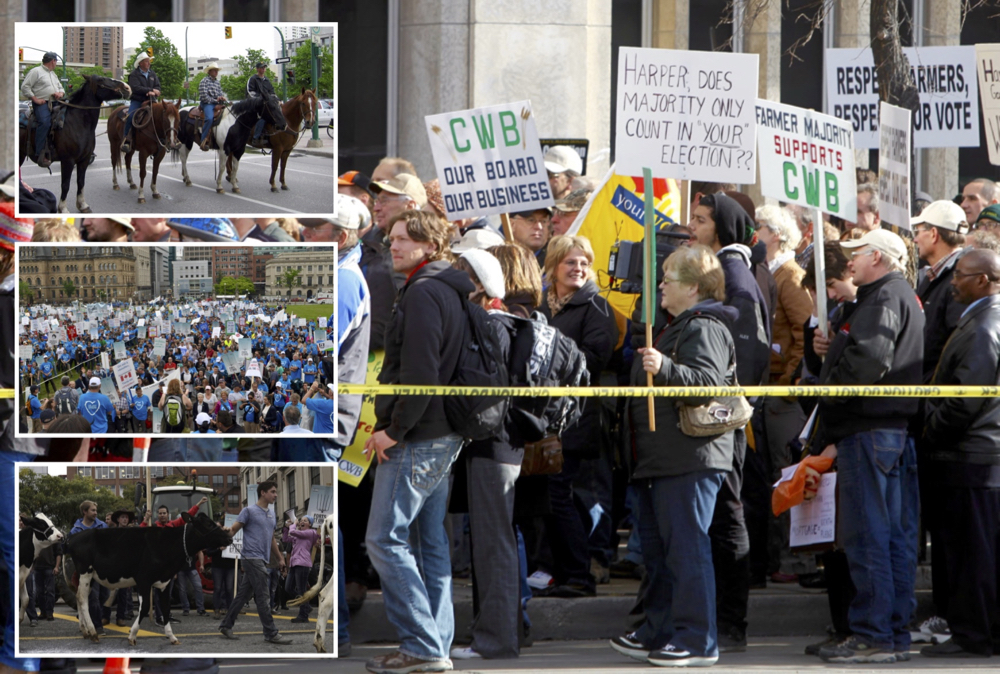When considering the province’s ‘anti-protest’ protection of critical infrastructure bill, consider that farmers also have a long history of protest, the NFU says.
“It’s going to affect the entire public,” said Anastasia Fyk, a board member with Manitoba’s branch of the National Farmers Union.
Bill 57, the Protection of Critical Infrastructure Act, proposes to allow Manitobans to apply for a court order to establish a protection zone around infrastructure deemed critical “if there is intention to hinder or delay construction, operation, maintenance or repair,” a news release from the province says.
Read Also

Trade uncertainty, tariffs weigh on Canadian beef sector as market access shifts
Manitoba’s beef cattle producers heard more about the growing uncertainty they face as U.S. tariffs, and shifting trade opportunities, reshape their market.
People who breach the protection zone could get fined up to $5,000 or imprisoned up to 30 days. A corporation that breaches the order could be fined up to $25,000.
The bill lists animal-processing facilities, feedlots, food-processing facilities, grocery stores, banking facilities, hospitals, clinics, quarantine facilities, personal care homes, drug-manufacturing facilities, oil and gas pipelines, airports, provincial trunk highways and railways, among other infrastructure that could be deemed critical.
A provincial news release and the preamble to the bill tie the bill to protests. Some Indigenous groups felt it was targeted at them.
“It is a strategy to silence the voices and views of First Nation peoples who have been excluded for a very long time from infrastructure strategy and investments in terms of our partnership on a government-to-government basis,” said Grand Chief Jerry Daniels, head of the Southern Chiefs Organization, in an emailed statement to the Co-operator.
The Southern Chiefs Organization said it will likely take the legislation, if passed, to court. “We have to challenge it at every aspect,” Daniels said.
“(Bill) 57 would silence our voices and just make us conveniently protest over there in the corner far away from where the heart of the issue is,” Lisa Currier, with Idle No More and an organizer of a protest against the bill, told CBC on March 23.

Infrastructure as leverage
Last October, protesters blocked Provincial Trunk Highway 75 near Morris for over two hours — an act they said was in solidarity with members of the Haudenosaunee community of Six Nations protesting in Caledonia, Ontario, and also in protest of Bill 57, CBC reported.
In February 2020, protesters blocked a section of rail line west of Winnipeg in support of members of the Wet’suwet’en nation in B.C., who blocked a project to build a natural gas pipeline across their territory, a CBC report says.
The same month, protesters blocked Winnipeg’s Portage Avenue by lying outside RCMP headquarters during evening rush hour. According to a CTV report, the demonstration was calling attention to arrests related to a rail blockade set up by Mohawk protesters near Belleville, Ontario.
Another blockade closed CN’s main line between Prince George and Prince Rupert, which caused immediate impact on grain shipping and caused fears that propane would run out in parts of the country.
At the time, Mary Robinson, president of the Canadian Federation of Agriculture, told her membership that farmers were “severely and harshly impacted by the random blockades.”
In response to Bill 57, KAP said in a statement: “Manitoba farmers rely on a highly efficient system to deliver products to market and receive important shipments like equipment, feed and fuel. If farmers are unable to move their products or access the supplies they need, this can seriously affect their operation and the security of Canada’s food supply chain. Timely access to domestic and international markets is vital to the success of farm operations.”
Long history of protest
However, if farmers are glad to hear the province’s proposed crackdown on road- and rail-blocking demonstrations, Fyk proposed they consider their own long history of protest.
While the days of farm-based populist movements might be in the past, even the past couple of decades contain plenty of examples.

In 2001, between 30 and 40 farmers slept overnight in the Manitoba legislature. That day several hundred met to protest the province’s decision to accept a $90-million aid package from the feds, a sum they said was far too little, CBC reported.
A couple of years later the BSE crisis saw many protests aimed at both provincial and federal politicians calling for more aid and attention to the border closure.
In 2010, farmers rallied at St. Claude, led by then opposition MLA Blaine Pedersen, to protest the building of the Bipole III power line which the province planned to build across their land.
“They do not want this line interfering with their farming. And that’s the bottom line,” Pedersen told the Co-operator at the time.
Negotiations dragged on for several years. In February 2016, farmers and landowners camped out at a transmission site in the RM of Hanover, CBC reported.
“Hydro has just been bullying its way through,” a farmer told CBC.
In 2013, between 50 and 60 farmers used tractors and equipment to block access to the Portage Diversion so the province could not activate the channel, CBC reported.

“They didn’t pay us for the last time they stored water on our property and we don’t want to store any more until they pay up for what’s still owing from the 2011 flood,” a Langruth-area farmer told CBC.
Water funnelled through the diversion to Lake Manitoba was blamed for devastating floods around the lake’s perimeter in 2011.
A court injunction forced the protesters to leave.
Days later, over 100 farmers and cottage owners converged on the Manitoba legislature over the same issue.
“There are two reasons why we are here. Flood mitigation and compensation,” a farmer told the Western Producer. “We will not take no for an answer.”
In November 2011, farmers dumped a pile of grain in front of an MP’s office in Brandon to protest the federal government’s decision to end the Canadian Wheat Board’s monopoly, CTV reported.

Days earlier, a group of around 350 farmers and supporters drove from the Red River Exhibition grounds to the Canadian Wheat Board’s office to protest the issue.
In 2013, an NFU-organized rally outside a Brandon MP’s office protested the approval of genetically modified, glyphosate-tolerant alfalfa.
Arguably, beef producers should be protesting the province’s plans to overhaul the Crown lands system, the NFU’s Ian Robson told the Co-operator. A group of Crown lands leaseholders has signalled its intent to take the province to court over the changes, which it says will devastate their farms and ranches.
“A protest points to a problem,” Robson said.
Build commonality
“We’re so focused on the present economic situation that we’re blinded by everything else. And that’s causing way more harm than anything,” said Fyk.
Indigenous peoples have protested for clean water, soil and air, said Fyk — these are things farmers value too.
“Farmers care about agriculture, and First Nations people care about the land. Why should we be pitted against each other by the government when we are all stewards of the land?” the SCO said. “It would go a long way to relationship building if they simply stood with us, and tried to understand us, as well as the colonized lands that we share through signed treaty relationships.”

The opposition NDP panned the legislation which it said, “undermines democracy and infringes on Manitobans’ right to freedom of expression and freedom of assembly,” in a news release on March 22.
The opposition party may designate up to five bills to be held over until the fall sitting of legislature.
Protest bills may be unconstitutional
Manitoba’s Bill 57 appears to be closely modelled on a similar bill passed in Alberta this past summer.
Alberta’s Bill 1 was aimed at protecting “essential infrastructure” such as highways, pipelines, oil sites, dams, farms and more. It included penalties up to a $25,000 fine, six months in jail, or both.
Critics there also claim the bill is aimed at suppressing the public’s right to protest, and legal experts have questioned its constitutionality.
“Our analysis is that the government would have a difficult time justifying Bill 1 because it is so broad and it does potentially impact marginalized groups more adversely,” University of Calgary law professor and co-author of the critique of Bill 1, Jennifer Koshan told Global News last June.
Other critiques include that the bill is addressing behaviour that is already criminalized in other legislation, such as trespassing law. She also noted that the definition of essential infrastructure was “quite broad” and that the legislation was also tantamount to the government giving itself powers to expand that mandate without oversight, through further regulation under the act.
In an editorial in mid-March, the Winnipeg Free Press editorial board raised similar concerns in an editorial.
… it’s a bill that seeks to render unlawful behaviour whose legal limits are already defined in criminal law, yet its own constitutionality is bound to be subject to a lengthy and expensive series of legal challenges as soon as it is proclaimed.
“One is left wondering what Mr. Pallister is seeking to achieve with a proposed bill whose principal attribute is the heavy-handed manner with which it would seek to pre-empt public displays of disagreement. Sound public policy, or just another settled grudge?” the editorial reads in part.
















